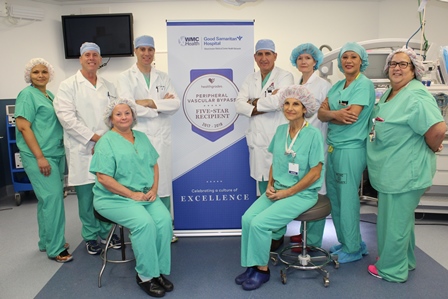
SUFFERN, N.Y. (December 5, 2017) - Good Samaritan Hospital, a member of the Westchester Medical Center Health Network (WMCHealth), has achieved Healthgrades' top rating for its performance in Peripheral Vascular Bypass for the second straight year.
Good Samaritan Hospital is the only hospital in lower New York State and northern New Jersey to receive five stars in both 2017 and 2018 for this surgical procedure. Only two other New York hospitals received the highest rating in the new Healthgrades 2018 Report to the Nation.
Healthgrades is the leading online resource for comprehensive information about physicians and hospitals. A five-star rating indicates Good Samaritan Hospital's clinical outcomes are significantly better than national averages when treating the condition or performing the procedure being evaluated.
"We are proud to receive this recognition from an organization like Healthgrades," said Michael Schwartz, MD, Chief of Vascular Surgery at Good Samaritan Hospital. "This award validates Good Samaritan Hospital's commitment to quality patient care, and recognizes the valuable contributions of our multi-disciplinary team members who provide the highest level of care."
Every year, Healthgrades evaluates performance for 32 of the most common inpatient procedures and conditions at nearly 4,500 hospitals nationwide.
The highly-skilled vascular surgery team specializes in treating vascular system diseases and includes experts in vascular surgery, interventional radiology, vascular anesthesia, and wound care, as well as vascular operating room nurses, lymphedema therapists and physical therapists.
Many vascular conditions are treated with minimally invasive techniques, such as balloon angioplasty, atherectomy and stents, which improve blood flow without major surgery. These minimally invasive treatments, called endovascular procedures, result in quicker recovery with less pain. "Unfortunately, not all vascular blockages are amenable to minimally invasive techniques, and in those cases, a peripheral vascular bypass is required," said Dr. Schwartz.
Three of the most recognized vascular diseases are abdominal aortic aneurysm, an enlargement in the largest artery in the body; carotid artery disease, a buildup of plaque that can cause a stroke; and peripheral arterial disease, hardening of the arteries that causes a buildup of plaque in blood vessels. Other vascular conditions treated at Good Samaritan Hospital include aortic arch conditions, aortoiliac occlusive disease, hemodialysis access, chronic venous insufficiency, deep vein thrombosis and lymphedema.
"We provide total comprehensive vascular care to patients with peripheral vascular diseases," said Dr. Schwartz. "Our success in peripheral bypass surgery is attributable to numerous factors, including a collaborative effort by multiple specialties and excellence in our operating nursing staff. In addition, experienced ICU nurses and early physical therapy allow for early discharge and minimize complications."
"In an environment where consumers have more choices about where to receive their care, a hospital's commitment to achieving high-quality outcomes is fundamental," said Brad Bowman, D, Healthgrades' Chief Medical Officer. "Because consumers place such value on this information, hospitals that achieve five stars for Peripheral Vascular Bypass stand out in their marketplace."
*Healthgrades evaluated approximately 45 million Medicare inpatient records from nearly 4,500 short-term acute-care hospitals nationwide to assess hospital performance in 32 common conditions and procedures. Healthgrades recognizes a hospital's quality achievements for cohort-specific performance, specialty area performance and overall clinical quality. The complete Healthgrades 2018 Report to the Nation and detailed study methodology can be found at www.healthgrades.com/quality.
**Statistics are based on Healthgrades analysis of MedPAR data for years 2014 through 2016 and represent three-year estimates for Medicare patients only.